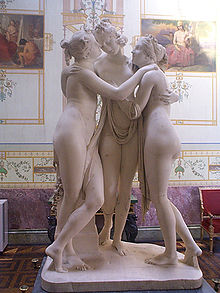| Euphrosyne | |
|---|---|
| Goddess of good cheer, joy and mirth | |
| Member of The Charites | |
 A statue of Euphrosyne in Achilleion palace, Corfu. A statue of Euphrosyne in Achilleion palace, Corfu. | |
| Affiliation | Aphrodite |
| Major cult centre | Boeotia |
| Abode | Mount Olympus |
| Parents | Zeus and Eurynome Erebus and Nyx |
In ancient Greek religion and mythology, Euphrosyne (/juːˈfrɒzɪniː/; Ancient Greek: Εὐφροσύνη, romanized: Euphrosúnē) is a goddess, one of the three Charites, known in ancient Rome as the Gratiae (Graces). She was sometimes called Euthymia (Ancient Greek: Εὐθυμία, lit. 'happiness') or Eutychia (Ancient Greek: Εὐτυχία, lit. 'good cheer').
Family
According to Hesiod, Euphrosyne and her sisters Thalia and Aglaea are the daughters of Zeus and the Oceanid nymph Eurynome. Alternative parentage may be Zeus and Eurydome, Eurymedousa, or Euanthe; Dionysus and Coronis; or Helios and the Naiad Aegle.
The Roman author Hyginus, in his Fabulae, also mentions a figure named Euphrosyne, who is the daughter of Nox (Night) and Erebus (Darkness).
Mythology
Euphrosyne is a goddess of good cheer, joy and mirth. Her name is the female version of the word euphrosynos, "merriment". Pindar wrote that these goddesses were created to fill the world with pleasant moments and good will. The Charites attended the goddess of beauty Aphrodite.
In art, Euphrosyne is usually depicted with her sisters dancing.

Cults
Euphrosyne and her sisters' main cult was located in Athens, Sparta, or Boetia.
Legacy
In art and literature

- Euphrosyne is depicted with the other two Graces, Aglaea and Thalia, at the left of the painting in Botticelli's Primavera. The sculptor Antonio Canova made a well-known piece in white marble representing the three Graces, in several copies including one for John Russell, 6th Duke of Bedford.
- Joshua Reynolds painted Mrs. Mary Hale, wife of General John Hale, as Euphrosyne in 1766.
- John Milton invoked her in the poem L'Allegro. She also has a singing part as the spirit of mirth in John Dalton and Thomas Arne's 1738 musical adaptation of Milton's Comus and speaks the epilogue.
In science
- The asteroid 31 Euphrosyne is named after the goddess, as is the Euphrosinidae family of marine worms.
- Augustin Pyramus de Candolle named a genus of plants in the family Asteraceae Euphrosyne.
Notes
- Hyginus, Fabulae Preface.
- Pindar, fr. 155
- Hesiod, Theogony 907
- Cornutus, Compendium of Greek Theology 15
- Nonnus, Dionysiaca 15.87 & 48.530
- Pausanias, 9.35.5
- Hyginus, Fabulae Preface.
- ^ Larson, Jennifer (2007). Ancient Greek Cults. New York, NY: Routledge. pp. 162–163. ISBN 978-0415491020.
- Pindar, Olympian Ode 14.1-20
- Homeric Hymn 5 to Aphrodite 58
- "www.britannica.com". Retrieved 2016-08-31.
- The Three Graces. Victoria & Albert Museum, 2013. Retrieved 2 May 2013.
- "Milton, L'Allegro and Il Penseroso Archived 2019-03-06 at the Wayback Machine"
- Comus, a Mask (Now adapted to the Stage), London 1738
References
- Hesiod, Theogony from The Homeric Hymns and Homerica with an English Translation by Hugh G. Evelyn-White, Cambridge, MA., Harvard University Press; London, William Heinemann Ltd. 1914. Online version at the Perseus Digital Library. Greek text available from the same website.
- Nonnus of Panopolis, Dionysiaca translated by William Henry Denham Rouse (1863–1950), from the Loeb Classical Library, Cambridge, MA, Harvard University Press, 1940. Online version at the Topos Text Project.
- Nonnus of Panopolis, Dionysiaca. 3 Vols. W.H.D. Rouse. Cambridge, MA., Harvard University Press; London, William Heinemann, Ltd. 1940-1942. Greek text available at the Perseus Digital Library.
- Pausanias, Description of Greece with an English Translation by W.H.S. Jones, Litt.D., and H.A. Ormerod, M.A., in 4 Volumes. Cambridge, MA, Harvard University Press; London, William Heinemann Ltd. 1918. ISBN 0-674-99328-4. Online version at the Perseus Digital Library
- Pausanias, Graeciae Descriptio. 3 vols. Leipzig, Teubner. 1903. Greek text available at the Perseus Digital Library.
- Pindar, Odes translated by Diane Arnson Svarlien. 1990. Online version at the Perseus Digital Library.
- Pindar, The Odes of Pindar including the Principal Fragments with an Introduction and an English Translation by Sir John Sandys, Litt.D., FBA. Cambridge, MA., Harvard University Press; London, William Heinemann Ltd. 1937. Greek text available at the Perseus Digital Library.
- The Homeric Hymns and Homerica with an English Translation by Hugh G. Evelyn-White. Homeric Hymns. Cambridge, MA., Harvard University Press; London, William Heinemann Ltd. 1914. Online version at the Perseus Digital Library. Greek text available from the same website.
| Ancient Greek deities | |||||||||||||
|---|---|---|---|---|---|---|---|---|---|---|---|---|---|
| Early deities | |||||||||||||
| Titans |
| ||||||||||||
| Olympian deities |
| ||||||||||||
| Water deities |
| ||||||||||||
| Personifications |
| ||||||||||||
| Other deities |
| ||||||||||||